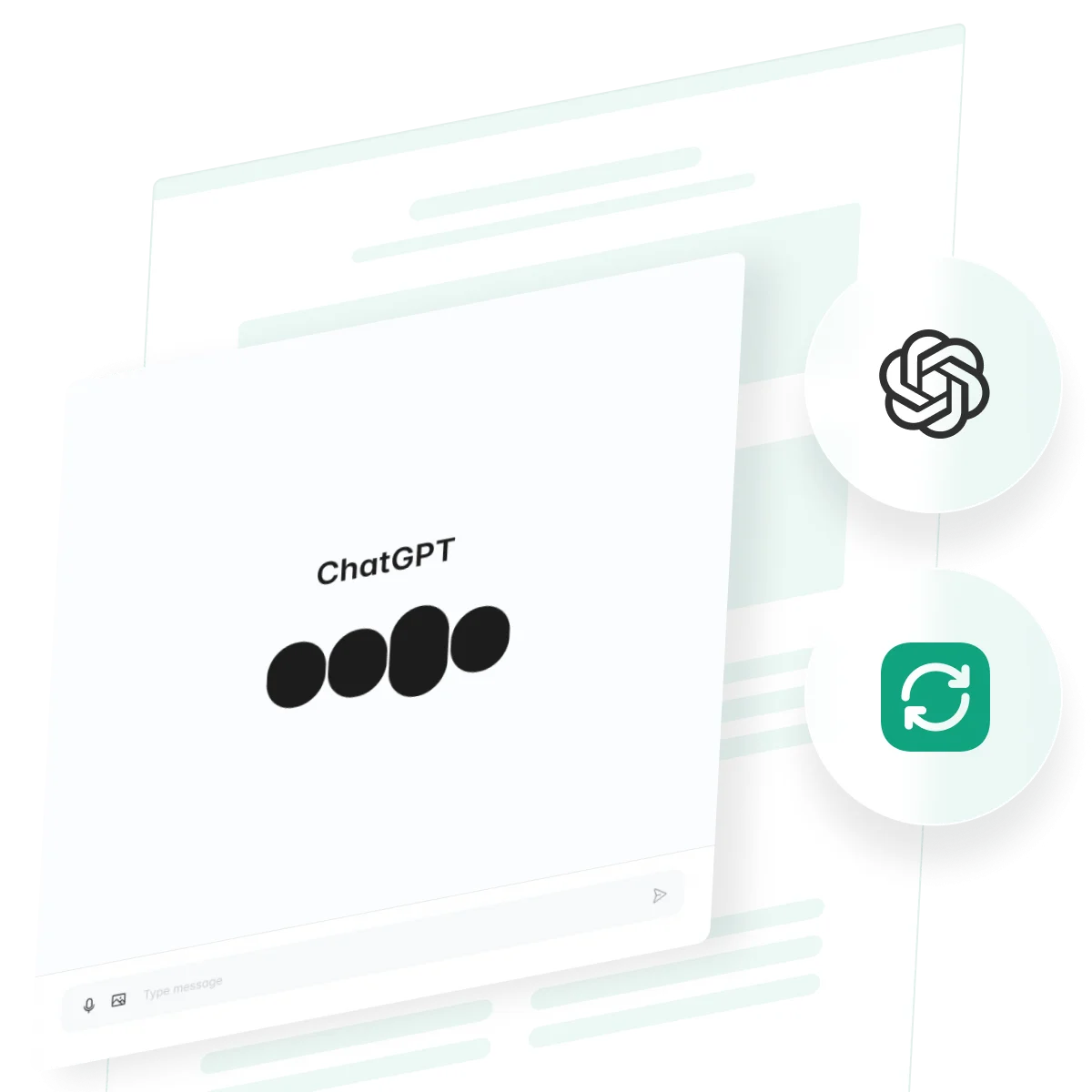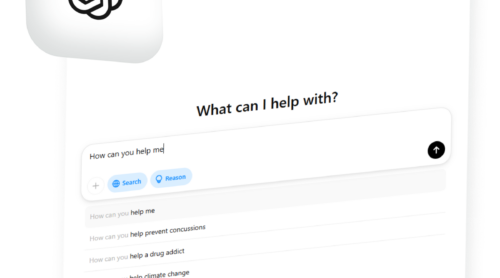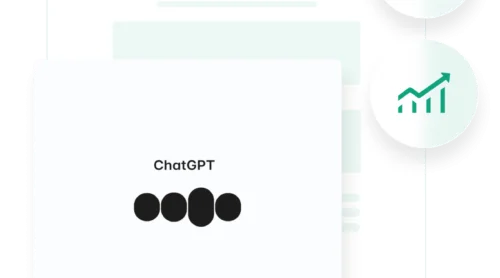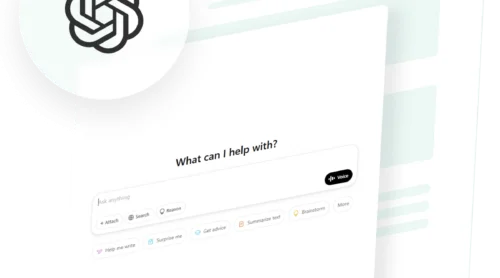AI is transforming business operations, and ChatGPT is leading the way by automating tasks, improving customer interactions, and enhancing productivity. Companies across industries — ecommerce, finance, healthcare, and marketing — are using ChatGPT to streamline workflows, generate content, and provide instant support.
From handling customer inquiries to creating SEO-optimized content and analyzing data, ChatGPT helps companies operate more efficiently. In this article, we’ll cover ChatGPT use cases for businesses as well as some helpful tips and ideas for prompts.
ChatGPT Applications in Business
As AI adoption grows, companies that integrate ChatGPT into their workflows will have a competitive edge. Let’s explore the best ChatGPT business use cases and how organizations can leverage this technology to optimize their operations.
🤝 Customer Support
Providing high-quality customer service is one of the most resource-intensive aspects of running a business. Traditionally, companies rely on large customer support teams to respond to inquiries, troubleshoot issues, and resolve complaints. However, this approach is costly, time-consuming, and often inefficient—especially for businesses with global operations that require 24/7 support.
This is where ChatGPT for customer support becomes a valuable solution. By integrating AI-powered chatbots and virtual assistants, businesses can automate customer interactions, ensuring fast and consistent responses without overwhelming human support agents. ChatGPT can be programmed to understand customer queries, provide relevant solutions, and escalate issues when necessary.
How ChatGPT Enhances Customer Service:
✅ Automating Responses to FAQs – AI can instantly answer common questions about products, services, shipping, refunds, and more, reducing customer wait times.
✅ AI-Powered Chatbots – Businesses can integrate ChatGPT into their websites and messaging platforms to provide round-the-clock support, ensuring customers get instant assistance at any time.
✅ Live Chat Assistance – ChatGPT can work alongside human agents, suggesting responses and summarizing previous interactions, helping support teams handle queries more efficiently.
✅ Multilingual Support – Companies with international customers can use ChatGPT to translate messages in real-time, enabling seamless communication in multiple languages.
With AI-powered automation, businesses can reduce support costs, improve response times, and enhance customer satisfaction, making ChatGPT an invaluable tool for modern customer service strategies.
Build an AI-powered chatbot with Elfsight and elevate your customer interactions today! Whether you’re new to chatbots or an experienced user, Elfsight’s easy setup and customizable features allow you to create a tailored solution fast.
Don’t miss the chance to improve engagement with AI assistant — give it a try now!
✍ Content Creation & SEO
In the digital age, content is king, and businesses need to consistently create high-quality materials to stay relevant. Whether it’s blog posts, social media updates, product descriptions, or email newsletters, content plays a crucial role in marketing and brand visibility. However, producing engaging, SEO-friendly content regularly requires time and expertise.
This is where ChatGPT for content creation can help. By leveraging AI, businesses can automate content generation, ensuring a steady stream of high-quality articles, social media posts, and marketing materials. ChatGPT can also assist in SEO optimization, helping brands rank higher in search engine results and attract organic traffic.
How Businesses Use ChatGPT for Content Marketing:
✅ Writing Blog Posts & Articles – AI can generate well-structured, informative content on various topics, providing businesses with ready-to-publish drafts.
✅ Crafting Social Media Captions & Ads – ChatGPT can create engaging captions, ad copy, and call-to-action messages tailored to specific platforms.
✅ Optimizing SEO with ChatGPT Prompts – Businesses can use ChatGPT prompts for SEO to generate keyword-rich titles, meta descriptions, and article outlines.
✅ Generating Email Marketing Content – ChatGPT can write persuasive email subject lines, promotional emails, and follow-up sequences, helping businesses maintain customer engagement.
By incorporating AI-powered content creation, companies can increase productivity, maintain a consistent online presence, and enhance their digital marketing efforts.
💰 Marketing & Sales
In today’s highly competitive market, speed and personalization are crucial for successful sales and marketing campaigns. Businesses must constantly engage with customers through various channels — email, social media, advertising, and direct messaging. However, manually creating marketing content and responding to leads can be time-consuming.
ChatGPT is one of the best AI tools for marketing and sales automation, allowing companies to generate personalized content, nurture leads, and optimize campaigns with AI-powered insights. ChatGPT can help businesses craft compelling messages, analyze customer data, and even predict trends based on historical interactions.
How ChatGPT Helps in Marketing & Sales:
✅ Creating Ad Copy & Email Campaigns – AI can generate attention-grabbing headlines, email sequences, and ad creatives optimized for conversions.
✅ Automating Lead Generation – ChatGPT can identify potential customers, qualify leads, and draft personalized outreach messages, improving conversion rates.
✅ Social Media Engagement – Businesses can use AI to schedule posts, write captions, and respond to customer comments, maintaining an active online presence.
✅ Sales Scripts & Pitches – ChatGPT can help sales teams by generating persuasive sales scripts, pitch decks, and negotiation strategies.
By automating sales and marketing tasks, businesses can increase efficiency, personalize customer interactions, and drive revenue growth.
📈 Data Analysis & Business Intelligence
Making informed business decisions requires analyzing large amounts of data, from financial reports to customer feedback and market trends. However, manually processing this data is time-consuming and prone to errors. Using ChatGPT for data analysis enables businesses to extract valuable insights quickly and efficiently.
ChatGPT can summarize reports, highlight key trends, and even generate business recommendations based on data patterns. While it’s not a replacement for advanced data analytics software, it serves as a powerful AI assistant for business intelligence.
How ChatGPT Assists with Data Analysis:
✅ Summarizing Business Reports – AI can analyze lengthy documents and generate concise summaries, making it easier for executives to review key points.
✅ Extracting Insights from Market & Competitor Analysis – ChatGPT can process industry reports and customer reviews to provide actionable insights.
✅ Forecasting Market Trends – While ChatGPT doesn’t predict future events, it can identify historical patterns and suggest potential business opportunities.
✅ Generating Data-Driven Business Strategies – AI can assist in drafting strategic plans based on past performance and market conditions.
By leveraging AI for data analysis, businesses can make smarter decisions, optimize performance, and stay ahead of market trends.
🎓 Business Training & Onboarding
Employee training and onboarding are critical for business success, but traditional training programs can be costly and time-consuming. Using ChatGPT for business training enables companies to provide instant, on-demand learning resources while reducing reliance on HR teams.
How ChatGPT Enhances Training & Onboarding:
✅ Answering Employee FAQs – AI can serve as an interactive knowledge base, providing instant answers to common company-related questions.
✅ Creating E-Learning Resources – Businesses can use ChatGPT to generate training manuals, quizzes, and interactive learning modules for employees.
✅ Personalized Training Support – AI can tailor training content based on job roles, ensuring employees receive relevant learning materials.
✅ Enhancing Internal Knowledge Management – Employees can use ChatGPT to quickly access company policies, workflows, and best practices.
By integrating AI-powered training, businesses can reduce onboarding time, improve employee engagement, and enhance knowledge retention.
Companies that embrace ChatGPT business use cases will stay ahead of competitors, leveraging AI to enhance customer experiences and drive growth. As AI continues to evolve, its potential applications in business will only expand — making it an essential tool for the future.
Tips on Implementing ChatGPT in Business
Incorporating ChatGPT into your business operations isn’t just about flipping a switch and letting the AI handle everything. To truly harness the power of this tool, businesses need to consider a few essential best practices. These strategies ensure that ChatGPT operates seamlessly, aligns with your team’s goals, and remains a valuable asset rather than just an automation gimmick.
Let’s dive into some practical ways to set your business up for success while using ChatGPT — focusing on training, customization, and continuous monitoring.
Training Employees: Setting Up for Success
Before deploying ChatGPT across your operations, training your team is crucial. ChatGPT is a powerful tool, but to use it effectively, employees need to be well-versed in its capabilities and limitations. Proper training ensures the tool is used efficiently while preventing over-reliance on automated responses that might lack the human touch.
Key Focus Areas for Training:
- Understanding the AI’s Strengths and Weaknesses:
Employees should know exactly where ChatGPT can add the most value. Whether it’s generating blog posts, automating customer inquiries, or compiling data, understanding what it can do and where human involvement is necessary will optimize its use. - Avoiding Over-Reliance:
A common pitfall is expecting ChatGPT to handle tasks that require creativity, empathy, or critical thinking — areas where human input is irreplaceable. Employees should learn to balance automation with personal oversight, ensuring the AI-generated content is relevant and aligned with your business’s voice.
The more your team understands how to interact with the tool, the more efficiently they can integrate it into their workflow without missing a beat.
Customizing ChatGPT: Tailoring AI to Your Business
ChatGPT is incredibly flexible. But to get the most value from it, customization is key. This isn’t just about setting up a chatbot to respond to inquiries — it’s about adapting the AI to fit your company’s specific needs. Whether you’re in finance, healthcare, or tech, ChatGPT can be tuned to speak your industry’s language and streamline workflows specific to your business.
Customization Strategies to Consider:
- Adjusting the Tone and Terminology:
Fine-tuning ChatGPT’s output so that it matches your business’s tone is essential for ensuring the AI feels like a natural extension of your team. It’s not enough for ChatGPT to generate generic responses — it should be able to communicate in industry-specific terms and reflect your company culture. This makes the tool feel more personalized to your customers and your business environment. - Integrating ChatGPT with Existing Systems:
ChatGPT isn’t a standalone tool — it works best when embedded into your existing systems. Whether that’s your CRM software, website, or marketing automation tools, the AI should work within your business ecosystem to increase efficiency. Automating tasks like lead generation or customer service inquiries becomes much easier when ChatGPT is plugged into your current infrastructure.
Continuous Monitoring: Ensuring Quality and Consistency
Once ChatGPT is integrated into your business processes, monitoring its performance is an ongoing necessity. Just like any tool, AI needs to be adjusted and calibrated over time to ensure it remains accurate and relevant. Whether it’s providing customer service, creating content, or analyzing data, ChatGPT should never be set on autopilot for long periods.
Monitoring Best Practices:
- Regular Audits:
It’s important to periodically evaluate how ChatGPT is performing. Run audits on its responses, analyze data for inconsistencies, and track its overall performance against your set goals. Identify areas of improvement — whether that’s tweaking its tone or updating its knowledge base with new data. - Human Oversight:
Although ChatGPT is an AI tool, it’s not infallible. Human input is necessary to catch any errors that might slip through or to make sure that responses stay true to your brand’s voice. For instance, while ChatGPT can help draft emails or social media posts, a human editor should review them before they are sent out to ensure personalization and quality.
Collaboration, Not Replacement: Finding the Right Balance
AI is here to complement your human team, not replace it. A key aspect of using ChatGPT effectively is recognizing that the best results come from collaboration between humans and AI. While ChatGPT can automate many tasks, it’s human ingenuity and strategic thinking that will guide your business to success.
How to Strike the Balance:
- Use AI for Routine Tasks:
ChatGPT is excellent for tasks that are repetitive or time-consuming, such as answering basic customer queries, generating reports, or creating first drafts of content. This frees up time for your team to focus on high-level tasks like strategy, customer relationship-building, and creative problem-solving. - Human Supervision for Strategic Initiatives:
For tasks requiring nuanced decision-making or emotional intelligence — such as customer service or marketing strategy — humans should remain in charge. ChatGPT can handle automated outreach and generate ideas, but your team should take the reins when it comes to final decisions and personalized interactions.
ChatGPT has the potential to revolutionize how businesses operate, but its success lies in how it’s integrated, managed, and monitored. By focusing on thorough employee training, customizing the tool for your specific needs, and continuously evaluating its performance, your business can maximize the value ChatGPT offers.
Remember, AI isn’t here to replace your team — it’s here to work with them, enhancing their capabilities and streamlining workflows. By taking a balanced, collaborative approach, businesses can ensure they’re leveraging AI to its fullest potential while maintaining the critical human element that drives their success.
Best ChatGPT Prompts for Business Success
ChatGPT can assist in a wide variety of business operations, from business plan creation and market research to the intricacies of starting a new business. Below are some of the most effective ChatGPT prompts, categorized by their specific business application, to help you maximize the potential of this powerful AI tool.
ChatGPT Prompts for Business Plan Creation
Creating a solid business plan is essential for establishing a successful business. A well-structured business plan provides clear guidelines on how to achieve your goals and secure funding.
- Create an executive summary for a new [type of business/product/service] in the [industry]. Highlight its unique value proposition, target market, and growth potential.
- Generate a competitive analysis for a [type of business, e.g., e-commerce platform] in the [industry]. Identify key direct and indirect competitors, their strengths and weaknesses, and your business’s potential market positioning.
- Write the financial projections section for a [type of business] in the [industry]. Include expected revenue, projected expenses, and a break-even analysis for the first three years, considering the specifics of your target market.
- Develop a comprehensive marketing strategy for a new [product/service] in the [industry]. Focus on key digital marketing channels such as social media, SEO, and email marketing, as well as customer acquisition strategies.
- Write a detailed operations plan for a new [type of business] in the [industry]. Include essential logistical elements such as supply chain, staffing, technology requirements, and customer service strategies.
- Provide a detailed analysis of the target audience for your [product/service]. Describe their demographics, psychographics, pain points, and purchasing behaviors specific to the [industry].
- Create a risk analysis for a [type of business/product] in the [industry]. Identify potential risks such as market shifts, competition, operational disruptions, and suggest actionable mitigation strategies.
- Write a market research summary for a business planning to enter the [industry]. Include data on market size, current trends, consumer needs, and any gaps your business can fill.
- Develop an outline for a business plan for a [type of startup, e.g., green energy or tech] in the [industry]. Include sustainability goals, government incentives, and potential environmental or societal impacts.
- Provide a strategy for scaling a [type of business/product/service] in the [industry]. Discuss expansion opportunities, scaling challenges, and essential partnerships for growth.
ChatGPT Prompts for Business Ideas & Market Research
When starting a business or exploring new growth opportunities, ChatGPT can be used to brainstorm innovative ideas and conduct thorough market research.
- Generate 10 innovative business ideas for the [health and wellness/tech/food] industry. Focus on emerging trends, consumer needs, and potential solutions for challenges in the market.
- Conduct market research on the demand for eco-friendly packaging in the [industry]. Include insights into customer sentiment, current market trends, competitor offerings, and business growth opportunities.
- Provide a list of five profitable business ideas in the [home automation/sustainable fashion/online education] industry. Consider both B2C and B2B opportunities, and highlight emerging consumer needs.
- Analyze the market potential for a [specific app/technology/service] in the [industry, e.g., customer service automation for e-commerce businesses]. Identify key trends, competition, and untapped opportunities.
- What are the latest market trends in [sustainable fashion/personal finance/healthcare]? Identify growth opportunities, emerging consumer preferences, and new business models that could disrupt the industry.
- Generate a list of 5 business ideas for [food delivery/remote work tools] catering to [niche markets such as vegan food, corporate employees, or the elderly]. Focus on pain points and unique solutions.
- Analyze the demand for subscription box services in the [e-commerce/gifting] industry. Provide insights into target customer demographics, key statistics, and strategies for differentiation in a competitive market.
- Conduct competitive research on the demand for mobile payment solutions in [emerging markets/urban centers]. Highlight the top competitors, challenges, and future market opportunities.
- What are the current market trends in [pet care/personalized fitness]? Provide detailed insights into customer behavior, industry growth, and potential business opportunities for new entrants.
- Generate five business ideas for [education technology/online learning] targeting [schools, universities, or working professionals]. Consider emerging needs like remote learning, skill-building, or personalized learning solutions.
ChatGPT Prompts for Starting a Business
Starting a business requires clear steps and a strategic approach. These ChatGPT prompts will guide you through the process of launching a new business in your chosen industry.
- Outline the first 30 days for launching an online store specializing in [type of products, e.g., home goods, fashion, or tech accessories]. Include steps such as setting up the website, sourcing products, and creating a marketing plan.
- Provide a step-by-step guide for registering a new business in [location/country]. Include details on obtaining licenses, permits, tax requirements, and any legal considerations for your specific industry.
- Help me craft an effective business pitch for securing funding for a [type of business, e.g., SaaS platform, retail store, or mobile app]. Outline the unique selling points of your product, your target market, and your financial projections.
- What are the best practices for launching a digital marketing campaign for a newly established [industry-specific business, e.g., beauty, tech, or real estate] online business? Focus on customer acquisition, branding, and generating leads.
- Generate a business checklist for launching a physical retail store specializing in [products/services]. Include tasks such as lease negotiation, interior design, inventory management, and staffing.
- Create an employee onboarding plan for a new [e-commerce business/tech startup/consulting firm]. Include a breakdown of job roles, training schedules, and an introduction to company culture and values.
- Provide a funding strategy for launching a [product-based business/service] in the [industry]. Suggest different funding options, including loans, angel investors, venture capital, and crowdfunding.
- Develop a detailed plan for setting up operations for a new [SaaS business/e-commerce store]. Include key considerations for technology platforms, team structure, and customer service systems.
- Generate a marketing campaign for launching a new [subscription service/product] targeting [audience, e.g., busy professionals, families, or fitness enthusiasts]. Focus on social media marketing, influencer outreach, and email campaigns.
- Provide a guide for building an initial customer base for a new [type of service, e.g., fitness coaching, cleaning service]. Highlight key customer acquisition strategies and ways to leverage early reviews and testimonials.
By using these ChatGPT prompts, you can tailor your business strategy to your specific industry and needs. Whether you’re writing your business plan, exploring new business ideas, or getting ready to start your business, ChatGPT’s assistance can simplify and enhance your approach.
Challenges When Using ChatGPT for Business
While ChatGPT presents numerous opportunities for businesses, it also comes with its own set of challenges. Being aware of these potential issues — and having solutions in place — will help ensure that ChatGPT is used effectively and safely in your business. Below, we’ll explore some of the common challenges and provide practical solutions in table format for better clarity.
Data Privacy & Security Concerns
One of the primary concerns businesses face when using AI tools like ChatGPT is data privacy and security. When handling sensitive customer or company data, safeguarding this information from breaches and unauthorized access is crucial.
| Solution | Details |
|---|---|
| Implement Robust Encryption Protocols | Ensure all data transmission between ChatGPT and other systems is encrypted to maintain security. |
| Use Anonymized Data | Train ChatGPT on anonymized or non-sensitive data to mitigate risks of exposing personal information. |
| Establish Clear Data Handling Policies | Develop policies to guide how data is handled within your business and by AI tools to ensure compliance with privacy regulations. |
| Regular Audits | Conduct periodic audits of your AI business tools to ensure they comply with privacy laws (e.g., GDPR) and assess data handling practices. |
By taking these steps, businesses can safeguard customer data and build trust when using ChatGPT.
Accuracy & Reliability of ChatGPT
ChatGPT is a powerful tool, but like any AI system, it is not infallible. Businesses need to ensure that the content and insights provided by ChatGPT are accurate, reliable, and up-to-date to avoid operational setbacks or negative customer experiences.
| Solution | Details |
|---|---|
| Implement a Human Review Process | Establish a process where critical outputs (like customer service responses or business strategies) are reviewed by human experts. |
| Fact-Check AI Outputs | Set up systems to cross-check AI-generated insights with real-time data and credible sources to ensure accuracy. |
| Continuous Monitoring & Retraining | Regularly assess ChatGPT’s performance and retrain it based on new information, trends, and feedback. |
| Human Verification | Always verify AI-generated insights and decisions with a human to ensure they meet your business’s specific standards and requirements. |
These solutions ensure that while ChatGPT can significantly aid in decision-making, businesses maintain control over the accuracy of critical processes.
Integration Without Disruptions
The integration of ChatGPT into existing systems can be a challenging process if not done thoughtfully. Poor integration can lead to inefficiencies, confusion, or disruptions that can hurt both employee productivity and customer satisfaction.
| Solution | Details |
|---|---|
| Seamless API Integrations | Use robust API integrations to ensure that ChatGPT easily connects with your CRM systems, websites, and automation tools. |
| Pilot Testing | Start with a pilot program in one department or business area to address any potential issues before implementing it company-wide. |
| Clear Guidelines for Interaction | Set clear expectations and procedures for when and how ChatGPT should be used, whether for customer service or internal tasks. |
| Employee Training | Provide training to employees on how to interact with ChatGPT, highlighting its capabilities, limitations, and best practices. |
By integrating ChatGPT properly and ensuring employees are trained, businesses can avoid disruptions and maximize the tool’s value.
Using ChatGPT for business purposes can unlock incredible opportunities for automation, data analysis, and customer engagement. However, as with any technology, challenges can arise. By addressing concerns such as data privacy, accuracy, and integration upfront, businesses can mitigate risks and ensure a smooth, productive experience with AI tools.
Conclusion
Incorporating ChatGPT into business operations offers immense potential for improving efficiency, customer interactions, and data analysis. However, businesses must carefully navigate challenges such as data privacy concerns, accuracy issues, and smooth integration to ensure the tool’s effectiveness. By following best practices and applying the solutions outlined in this article, businesses can leverage AI to streamline operations without compromising quality or security.






